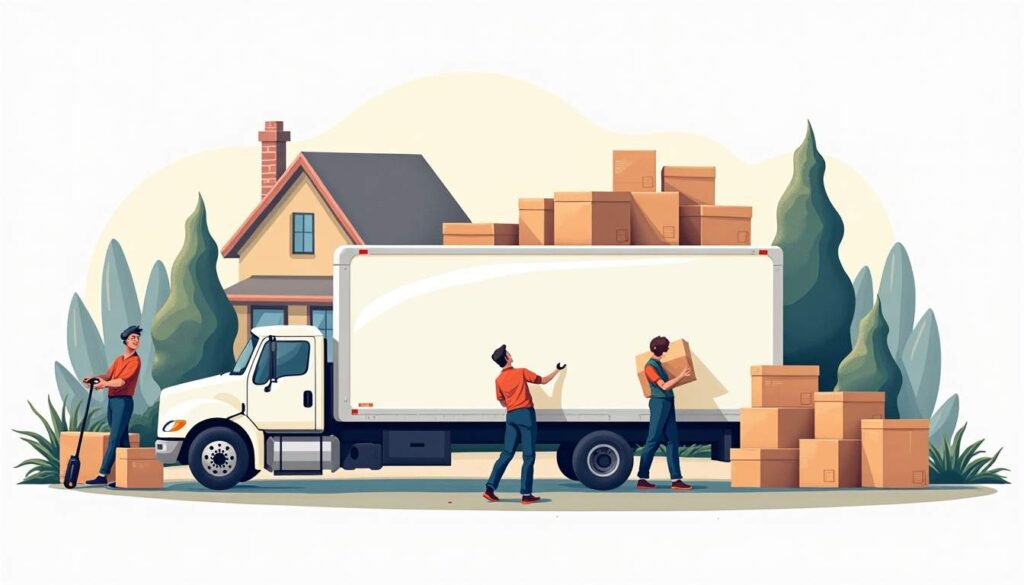When thinking about a professional moving team, many people picture workers in matching uniforms carrying boxes and furniture. While uniforms do contribute to a polished appearance, professionalism in the moving industry goes far beyond what meets the eye. A truly professional moving team combines expertise, reliability, customer service, and even sustainability to provide a seamless relocation experience. In fact, the U.S. moving industry generates approximately $17 billion annually, reflecting the importance of high standards in this bustling sector Moving Industry Statistics: Reports 2025.
Understanding what sets a moving team apart can help customers make informed choices and ensure their move is as stress-free as possible. This article explores the key attributes that define professionalism in moving teams today.
Expertise and Experience: The Foundation of Professionalism
One of the most critical factors that distinguish a professional moving team is their level of expertise and experience. Moving is a complex process that involves careful planning, packing, loading, transporting, and unloading. A team with years of experience understands how to handle fragile items, bulky furniture, and logistical challenges efficiently.
Professional movers are trained to assess the best methods for packing and securing belongings to prevent damage during transit. Their knowledge extends to navigating permits and regulations, especially for interstate moves where the average cost can be around $4,100 50 Awesome Moving Industry Statistics for 2023. This expertise reduces the risk of costly mistakes and delays, ensuring a smoother relocation.
Moreover, experienced teams often have a track record of positive customer feedback, which is a reliable indicator of their professionalism. They know how to communicate clearly and set realistic expectations, which helps build trust with clients from the outset.
In addition to their practical skills, professional movers are often equipped with specialized tools and equipment that enhance their efficiency. For instance, they may use dollies, ramps, and padding to protect your belongings during the move. This not only speeds up the process but also minimizes the physical strain on the movers themselves, allowing them to work more effectively. Furthermore, many moving companies invest in ongoing training for their staff, ensuring they stay updated on the latest techniques and safety protocols in the industry.
Another aspect of professionalism is the ability to handle unexpected situations. Whether it’s a last-minute change in the moving schedule or an unforeseen obstacle during transport, experienced movers are adept at problem-solving on the fly. Their familiarity with various scenarios allows them to adapt quickly, ensuring that your move remains on track. This level of adaptability is invaluable, as it can significantly reduce stress for clients who may already be feeling overwhelmed by the logistics of moving.
Customer Service: More Than Just a Friendly Smile
Professionalism in moving also hinges on exceptional customer service. Moving can be an emotional and stressful event, so a team that prioritizes clear communication, empathy, and responsiveness makes a significant difference. It’s not just about moving boxes; it’s about moving lives.
Recent trends show that the relocation industry is increasingly integrating AI and automation to enhance customer service and logistics management Relocation Industry Statistics. These technologies help streamline scheduling, provide real-time updates, and answer common questions promptly, improving the overall customer experience. Moreover, AI-driven chatbots can assist clients 24/7, ensuring that help is always just a message away, which is particularly valuable during the often chaotic moving process.
Additionally, professional movers understand the importance of transparency, providing detailed estimates and being upfront about any potential extra costs. They also offer support throughout the moving process, from initial consultation to final delivery, ensuring clients feel supported every step of the way. This commitment to transparency not only builds trust but also fosters long-term relationships with clients, who may return for future moves or recommend the service to friends and family. Furthermore, many companies now offer personalized moving plans tailored to individual needs, accommodating everything from fragile items to special requests, which further enhances the customer experience.
In today’s competitive market, companies that excel in customer service often stand out by providing additional resources, such as packing tips, checklists, and post-move support. This holistic approach not only alleviates stress but also empowers clients to take control of their moving journey. By offering these value-added services, moving companies demonstrate their commitment to not just the logistics of the move, but also the emotional well-being of their clients, making the transition to a new home as smooth and enjoyable as possible.
Reliability and Efficiency: Delivering on Promises
Reliability is a hallmark of any professional moving team. Customers expect their belongings to arrive on time and in the same condition as when they were packed. Teams that consistently meet deadlines and handle items with care earn a reputation for dependability. This reputation is built not just on successful moves but also on transparent communication throughout the process. Keeping clients informed about timelines, potential delays, and the status of their belongings fosters trust and reassures them that their possessions are in capable hands.
Efficiency is closely tied to reliability. Professional movers use well-planned logistics to optimize routes and minimize downtime, which is crucial given the projected 7% annual growth of the relocation industry through 2030 Relocation Industry Statistics. This growth reflects increasing demand for high-quality moving services, pushing companies to refine their operational processes. In addition to route optimization, many moving companies are now adopting technology such as GPS tracking and inventory management systems. These tools not only streamline operations but also enhance customer experience by providing real-time updates and detailed tracking of items during transit.
Moreover, professional teams invest in proper equipment and vehicles designed to handle various types of moves, from local to long-distance. This investment not only protects clients’ belongings but also helps avoid delays caused by mechanical issues or inadequate tools. Furthermore, the training and expertise of the moving staff play a crucial role in ensuring efficiency. Well-trained movers are adept at packing techniques that maximize space and minimize damage, and they understand how to handle fragile items with the utmost care. This level of professionalism not only safeguards the items being transported but also contributes to a smoother, more organized moving experience for clients.
In addition to these operational efficiencies, many moving companies are now focusing on sustainability practices. By implementing eco-friendly packing materials and optimizing fuel consumption through route planning, they are not only enhancing their service reliability but also appealing to a growing market of environmentally conscious consumers. This commitment to sustainability not only benefits the planet but also positions these companies as leaders in the industry, setting a standard for others to follow.
Commitment to Sustainability: The New Standard
In recent years, the moving industry has witnessed a growing demand for eco-friendly and sustainable moving options, which increased by 22% in 2023 Relocation Industry Statistics. Professional moving teams are increasingly adopting green practices to meet this demand and reduce their environmental footprint.
Over 40% of movers now opt for sustainable packing materials such as biodegradable bubble wrap, recycled boxes, and reusable crates Moving Industry Statistics: Reports 2025. This shift not only appeals to environmentally conscious customers but also helps companies differentiate themselves in a competitive market.
Furthermore, some moving companies incorporate fuel-efficient or electric vehicles into their fleets, reducing emissions during transport. This commitment to sustainability reflects a broader industry trend towards responsible business practices and resonates with the values of many modern consumers.
Teamwork and Professionalism on the Ground
Beyond appearances, the interpersonal dynamics of a moving team play a crucial role in professionalism. A cohesive team that works well together can handle unexpected challenges calmly and efficiently, ensuring the move stays on track.
Professional movers demonstrate respect not only for their clients but also for each other. This respect translates into careful handling of belongings, polite interactions, and a positive overall atmosphere during the move. Such behavior reassures clients that their possessions are in good hands.
Additionally, many moving companies invest in ongoing training for their employees, covering topics such as safety protocols, customer interaction, and the latest packing techniques. This continuous development fosters a culture of excellence and accountability.
Conclusion: Professionalism Is a Holistic Experience
Ultimately, what makes a moving team truly professional extends far beyond uniforms and appearances. It encompasses expertise, exceptional customer service, reliability, efficiency, and a commitment to sustainability. As the moving industry continues to grow—projected to reach nearly $38 billion globally by 2033 Moving Services Market Size & Industry Analysis 2033—these qualities will become even more important for companies seeking to stand out.

For customers, understanding these dimensions of professionalism can lead to better decisions and a more positive moving experience. After all, moving is not just about transporting belongings; it’s about trusting a team to help start a new chapter in life with care and confidence.




